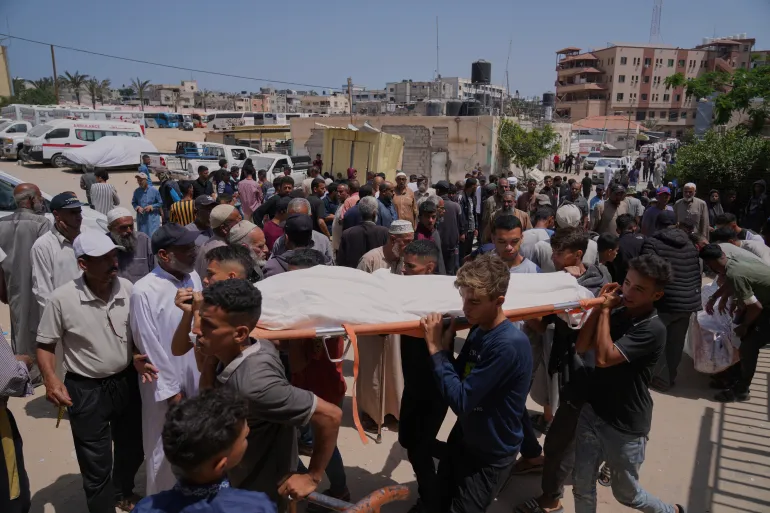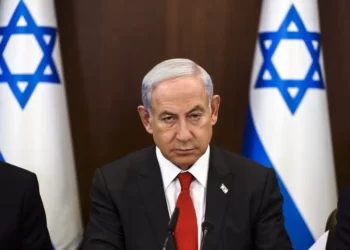In the face of a deepening humanitarian catastrophe in Gaza, aid intended to save lives is now reportedly contributing to the crisis. What was launched as a humanitarian lifeline now stands accused of fueling further tragedy in a region already on the brink.
Over the past week alone, dozens of Palestinians — primarily civilians seeking food — have been killed near aid distribution sites operated by the Israeli-backed Gaza Humanitarian Foundation (GHF).
More than 30 Palestinians were killed by Israeli fire on Sunday, June 1, 2025, as they went to receive food at an aid distribution point set up by the Israeli-backed foundation in Gaza.

The UN’s human rights office said that the killings on Sunday follow multiple reports of deadly attacks at the sites between May 27 and 31, which killed at least 19 Palestinians and wounded 80 others.
To many observers, these “shootings” are beginning to resemble something far more sinister.
Speaking with the Vaultz News, Henry Osabutey, a human rights, peace and conflict studies scholar and Global Goodwill Ambassador, opined that the Gaza Humanitarian Foundation’s (GHF) model of aid delivery was never a good idea.
He asserted that it was clear from the beginning that the GHF didn’t have the skills, experience, or trust to handle such a big job in Gaza, which is already dangerous and overcrowded.
“Imagine giving a job meant for experienced doctors to someone who just finished first aid training. That’s what happened here. Aid work is serious; it needs planning, people who understand the area, and organizations that are neutral; they don’t take sides. But GHF is seen by many as being too close to the Israeli government, so people didn’t feel safe.
“So yes, this approach was doomed from the start. It created more confusion and danger instead of helping the people.”
Henry Osabutey

According to Osabutey, excluding experienced groups like UN agencies and respected NGOs in aid distribution in Gaza is like “taking your best football players off the field in a World Cup final and bringing in people who’ve never played professionally.”
“In the long run, this will cause more people dying, not because there’s no food, but because they’re afraid to go collect it. [There will be] less trust in the aid system. People may believe food and help are being used as a weapon, not for support. [It could cause]More anger and bitterness, which could lead to more violence; not just in Gaza, but across the region.”
Henry Osabutey
He opined that the repeated fatalities at GHF sites do not look like accidents or simple mistakes. “When you see people being killed again and again at places where they’re just trying to get food, it starts to look like a pattern and that’s very worrying,” he said.
He stressed that it means something is deeply wrong with how this aid is being managed, “and possibly, how the Israeli military is handling the situation.” He added, “Whether it’s planned or not, the result is the same; innocent people are dying while trying to survive.”
Osabutey Suggests Way Forward

Moreover, Osabutey suggested that the solution lies in restoring control of aid delivery to trusted, experienced organizations — like the UN agencies and long-established NGOs that know how to navigate conflict zones. “They know what they’re doing and have done it for years,” he stated.
He added that every aid group must be checked and monitored to make sure they’re not abusing power or putting people in danger.
Most importantly, he said, “people in Gaza must be treated as human beings, not just numbers.”
“With my expertise and studies in international peace, conflict and human rights, I can explicitly assert that what is happening in Gaza is a tragedy that shows what happens when power is misused and humanity is lost…The world must stop talking and start acting, because people are not just suffering; they are dying while asking for help.”
Henry Osabutey
As Osabutey poignantly puts it, what is unfolding in Gaza is more of a collapse in how humanitarian support is conceived and delivered in the besieged enclave.
That reality demands action. Aid must never be used as a weapon, and those who need help should never have to risk their lives to receive it.
READ ALSO: Asante Gold Secures $110 Million to Boost Bibiani Mine Expansion




















